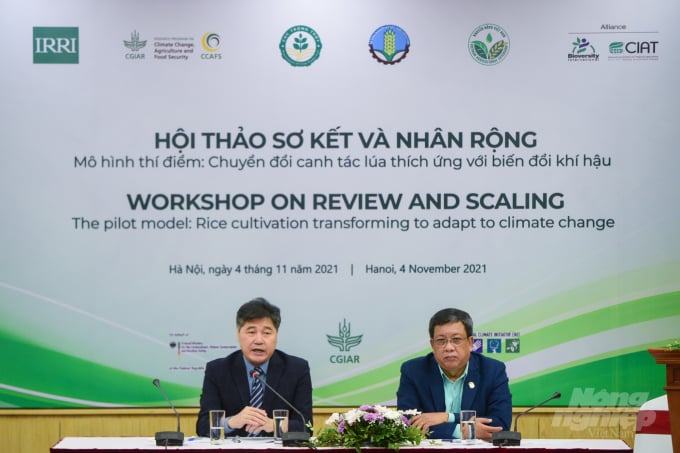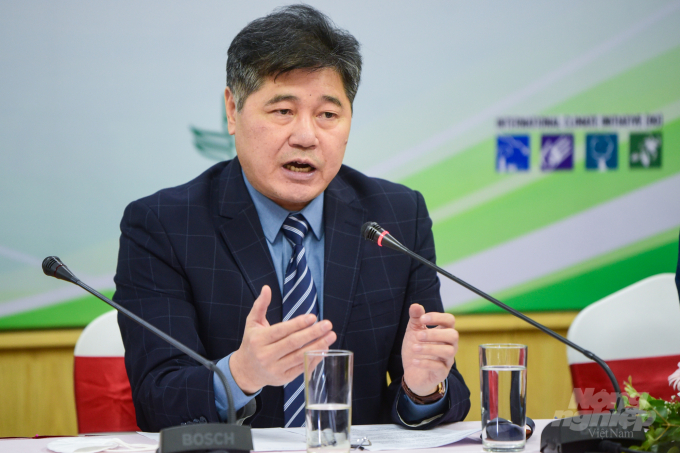June 1, 2025 | 04:50 GMT +7
June 1, 2025 | 04:50 GMT +7
Hotline: 0913.378.918
June 1, 2025 | 04:50 GMT +7
Hotline: 0913.378.918

The workshop on preliminary review and scaling of the model "rice cultivation transformation to adapt to climate change" was held on the morning of November 4. Photo: Tung Dinh.
The Department of Crops Production and the National Agricultural Extension Center (NAEC) creat a pilot model on Transforming Farming Systems Under Climate Change (TFCC) to determine future rice cultivation techniques in the face of climate change effects.
The CGIAR Research Program on Climate Change, Agriculture, and Food Security in Southeast Asia (CCAFS-SEA), the International Rice Research Institute (IRRI), and the DeRISK Southeast Asia Project Asia are collaborating on the project. The International Union for Biological Diversity and CIAT are also involved.
On November 4, stakeholders convened a workshop to examine the results of the one-year model and develop strategies for replicating it and implementing the project's recommendations.
According to NAEC Director Le Quoc Thanh, the initiative is a solution that brings together units of the Ministry of Agriculture and Rural Development and a number of foreign organizations and has resulted in very beneficial and practical impacts on production.
"This is a novel method that enables producers to be actively engaged in the planning process, visualizing strategies to address climate change while recognizing that its influence on output is not uniform. Exports in the Mekong Delta area are more robust and consistent," Mr. Le Quoc Thanh said.

Director of the National Center for Agriculture and Rural Development Le Quoc Thanh said this solution should be replicated in many localities in the Mekong Delta as well as in areas affected by climate change. Photo: Tung Dinh.
The Department of Crops Production and NAEC devised and presented during the workshop a roadmap for scaling up TFCC to additional agro-ecological zones in the Mekong Delta, with input from all stakeholders. The scale-up strategy will serve as a roadmap for local stakeholders in managing and implementing comparable initiatives.
Mr. Le Quoc Thanh said on the margins of a seminar on this subject that TFCC is a strategy that may be used in places impacted by climate change.
"We will encourage individuals to join more actively and to spread the word about the efficacy of this approach." A strategy has also been formed within the agricultural extension system to duplicate the TFCC outcomes in other provinces in the Mekong Delta and places at high risk of climate change effects," Mr. Le Quoc Thanh said.
Additionally, stakeholders generated risk maps and climate change adaptation plans (CS-MAPs) as well as local climate information services (at the commune level) during the workshop. Discuss the appropriateness and efficacy.
Adaptation plans designed for rice-producing areas include strategies for seed selection, agricultural practices, and harvesting schedules.
Additionally, a range of adaptation approaches, such as variety conversion, crop diversification, and land conversion to other crops, have been found. The collaborative production of the Agricultural Crop Bulletin (ACB) has been warmly accepted, particularly in light of recent improvements aimed at enhancing district and provincial stakeholder engagement and communication frequency.
On November 4, the session presented Technical Documents on CS-MAP development and a Local Agricultural Consultant. This article outlines the fundamental procedures necessary to conduct participatory risk mapping and adaptation planning at the local level. Additionally, the technical paper discusses in depth the process of developing and disseminating a Local Crop Advisory based on meteorological and climatic data.
Applying to the commune-level
The Climate Change Adaptation Planning and Risk Mapping (CS-MAP) strategy has been adopted down to the commune level to build the agricultural consultation, followed by the construction of agricultural newsletters (ACBs) appropriate for each locality's circumstances.
Participants in CS-MAP work together to identify climate-related risks using scientific evidence, local knowledge, and risk assessment; improve proposed adaptation measures; and develop integrated adaptation plans for rice production from regional to provincial levels.
Participatory agricultural suggestions are based on the CS MAP and crop planning and management advice based on weather and crop predictions.
The TFCC concept has been tested in three Mekong Delta communes: Hoa Chanh (U Minh Thuong district, Kien Giang province), An My (Ke Sach district, Soc Trang province) and Tan Phuoc (Go Cong Dong district - Tien Giang province).
Translated by Linh Linh

(VAN) Several scientists and farmers are experimenting with soil treatment in some key durian-growing regions such as Cai Lay (Tien Giang), Dak Song, Gia Nghia, and Dak R’lap (Dak Nong).
/2025/05/25/4127-3-073637_820.jpg)
(VAN) Thanks to the promotion from an FAO-implemented project, vegetable production in greenhouses in Moc Chau has seen strong development, from 1.5 hectares in 2021 to nearly 50 hectares in 2024.

(VAN) FAO has recently supported USD 140,000 to implement the project 'Risk mitigation human-animal interface risks through disease control initiatives in pig farming.'

(VAN) The People's Committee of Tra Vinh province has approved an adjustment to the investment policy for the Green Hydrogen Plant project, increasing its area to approximately 52.76 hectares.
![Reducing emissions from rice fields: [2] Farmers’ commitment to the soil](https://t.ex-cdn.com/nongnghiepmoitruong.vn/608w/files/news/2025/05/05/dsc08881jpg-nongnghiep-140632.jpg)
(VAN) Clean rice cultivation model in Thuong Tan commune, Bac Tan Uyen district, is assisting local residents in achieving sustainable agriculture by substantially reducing costs, increasing productivity, and protecting the environment.

(VAN) At the conference to disseminate Resolution No. 68, AgriS introduced its digital agricultural ecosystem and reaffirmed its commitment to accompanying the Government in promoting private sector development and sustainable agriculture.

(VAN) 'Blue Ocean - Blue Foods' initiative is designed to restore marine ecosystems and establish sustainable livelihoods for local communities by cultivating a minimum of 1,000 hectares of cottonii seaweed in the first three years.